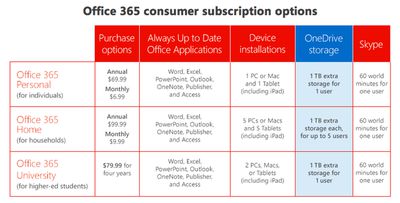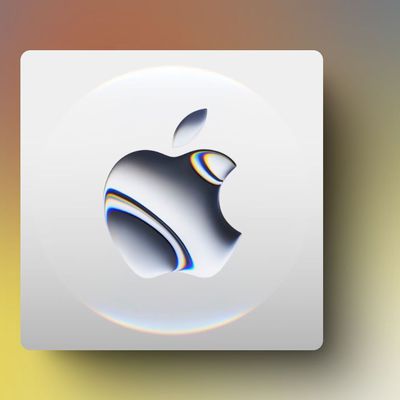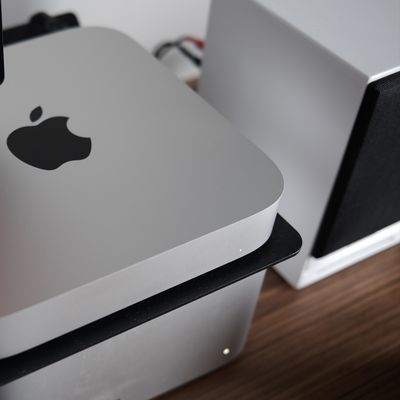Microsoft Boosts OneDrive Cloud Storage to 1TB for Office 365 Subscribers, 15GB Free for All
Microsoft today announced several changes to its OneDrive cloud storage services, starting with a massive increase to 1 TB of storage for all Office 365 subscription plans. This expanded storage will be will be automatically added to existing Home, Personal, University or Business subscribers starting in July. While the 1TB feature is new for Home, Personal, and University users, this upgrade previously was announced for Office 365 Business subscribers.

Today, OneDrive and Office are announcing a BIG change to that benefit for consumers, to the tune of 1 TB per user. That’s right–we’re increasing the OneDrive storage allotment included with Office 365 Home, Office 365 Personal, and Office 365 University from 20 GB to 1 TB. That’s a whopping 50 times, or 5,000 percent increase in storage–and it’s going to be here before classes are in session!
For OneDrive users who are not Office 365 subscribers, Microsoft has also sweetened the deal by boosting the free storage allotment from 7 GB to 15 GB. Prices for additional storage plans also are being slashed by 70 percent, with new monthly prices starting at $1.99 for 100 GB (previously $7.49) and $3.99 for 200 GB (previously $11.49).
This Cloud storage expansion is one of several recent initiatives that encourage consumers to use Microsoft's Office platform. Earlier this year, Microsoft brought its Office suite to the iPad with tablet-friendly versions of Word, Excel, and PowerPoint. The Redmond company also introduced a new Personal Office 365 subscription plan for individuals and a Home plan for families that complement its multi-user business subscriptions.
Apple is of course also expanding its cloud storage services alongside iOS 8 and OS X Yosemite with the launch of iCloud Drive. Apple has yet to announce full details on iCloud Drive pricing, but at a minimum it includes options at 5 GB for free, 20 GB for $0.99/month, and 200 GB for $3.99/month, with higher tiers also available.
Popular Stories
The first iOS 18.4 beta for iPhones should be just around the corner, and the update is expected to include many new features and changes.
Bloomberg's Mark Gurman expects the iOS 18.4 beta to be released by next week.
Below, we outline what to expect from iOS 18.4 so far.
Apple Intelligence for Siri
Siri is expected to get several enhancements powered by Apple Intelligence on iOS...
Apple is set to "significantly change" the iPhone's design language later this year, according to a Weibo leaker.
In a new post, the user known "Digital Chat Station" said that the iPhone's design is "starting to change significantly" this year. The "iPhone 17 Air" reportedly features a "horizontal, bar-shaped" design on the rear, likely referring to an elongated camera bump. On the other...
Apple has yet to announce any new devices this year, but that could change starting next week.
Apple CEO Tim Cook today said to "get ready" for a "launch" on Wednesday, February 19.
"Get ready to meet the newest member of the family," said Cook, in a social media post. The post includes an #AppleLaunch hashtag, along with a short video featuring an animated Apple logo inside of a circle....
Apple is "exploring" the idea of showing search ads in the Apple Maps app, according to Bloomberg's Mark Gurman.
Back in 2022, Gurman said software engineering was "already underway" to display ads in the Apple Maps app, but Apple did not move forward with the idea at the time. Today, he said Apple is "giving this notion more thought" again.
This time around, he said Apple has yet to...
Apple appears to have enough upcoming product announcements to justify a full event this month, yet all signs indicate these reveals will be handled through a series of press releases instead.
There are a multitude of rumors from reliable sources about specific announcements in the coming weeks, so here's everything that Apple could have feasibly included in a hypothetical February event:
...
Apple's next-generation iPhone 17 Pro will feature three rear cameras arranged in a familiar triangular layout, but the cameras will be housed in an all-new rectangular camera bar with rounded corners, according to YouTube channel Front Page Tech.
iPhone 17 Pro camera design render created by Asher for Front Page Tech
In a video uploaded today, Front Page Tech host Jon Prosser said the camera ...
A few days ago, we reported that Apple's refurbished Mac mini pricing had a problem, and it appears that Apple has taken note.
Apple was offering a refurbished Mac mini with the M2 chip, 16GB of RAM, and 256GB of storage for $559, which was $50 more than a refurbished Mac mini with the M4 chip, 16GB of RAM, and 256GB of storage. All other key specifications were equal.
That's no longer...
On this week's episode of The MacRumors Show, we discuss the imminent Apple product "launch" that is widely expected to be the fourth-generation iPhone SE.
Subscribe to The MacRumors Show YouTube channel for more videos
In a social media post on Thursday, Apple CEO Tim Cook teased an upcoming "launch" of some kind scheduled for Wednesday, February 19. "Get ready to meet the newest member of...






















